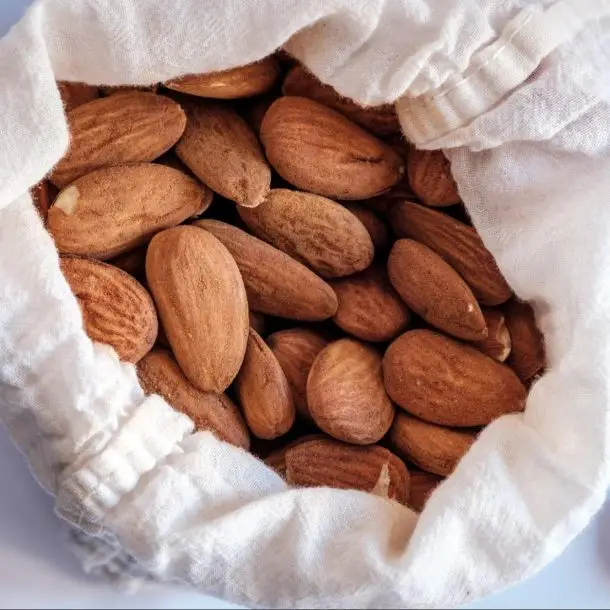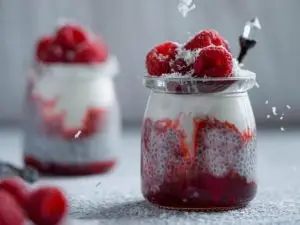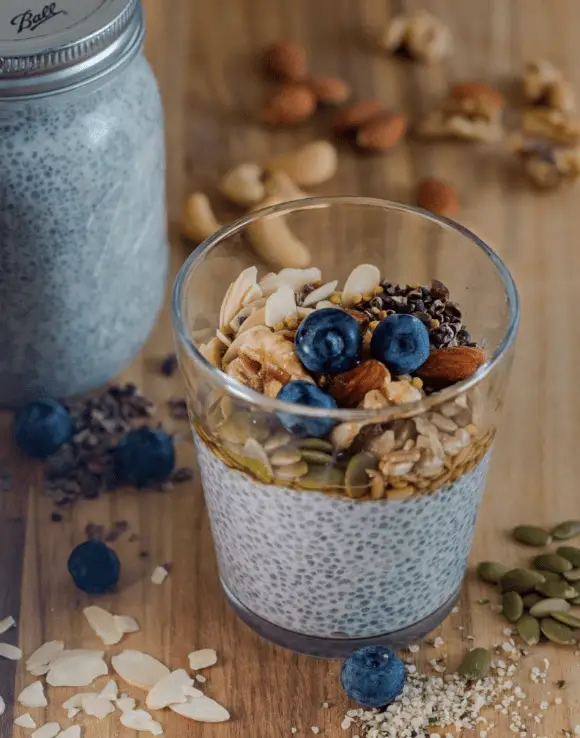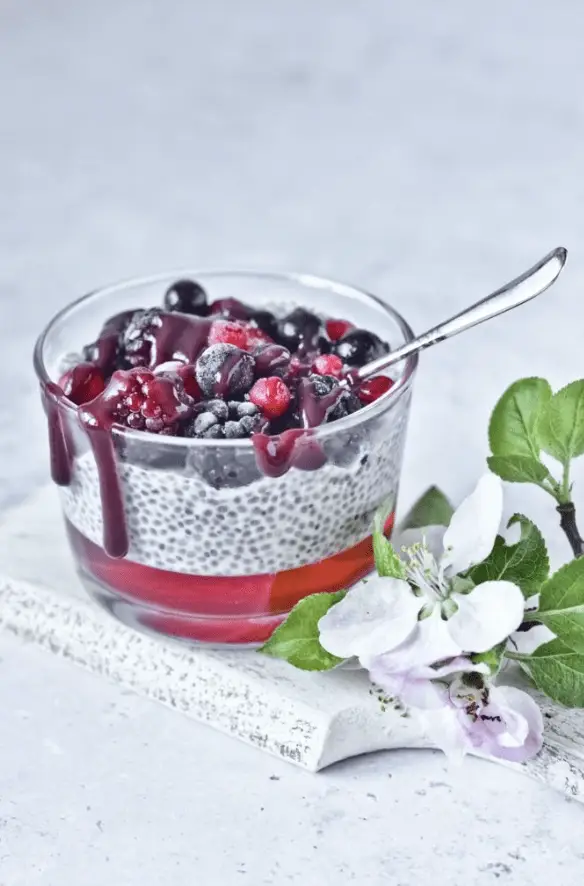

I have been blown away by the feedback I’ve been getting from you guys! I love that YOU love my blog, and I love that you’re always asking for more information. One of the questions I see most often is, “What to eat to get pregnant?” Since there are so many amazing options out there, I thought I’d answer it by writing a series of blogs called “Superfoods for Fertility!” First up, chia seeds!
Chia, also known as Salvia hispanica, means “strength” in Mayan. A species in the mint family, it can be traced back over 3,000 years to Central America, where the Aztecs used it as one of their primary plant sources of food. In fact, it was their third most important crop behind just corn and beans! Considered more valuable than gold, chia was often used to pay taxes and tribute to the Aztec nobility.
Chia seeds are one of the best foods for pregnancy (and the months leading up to conception!) because they’re chock full of all sorts of nutrients critical for fertility health! The most important? Omega-3 essential fatty acids. Omega-3 EFAs play a critical role in regulating hormones, increasing blood flow to the uterus, reducing sensitivity to the hormone prolactin (which can suppress ovulation), normalizing cycles, and–most importantly–increasing cervical mucus, which is needed to help the sperm reach the egg.
As a fertility nutritionist, I love sharing mouthwatering chia seed recipes with women who are trying to get pregnant. I also encourage them to keep eating chia seeds while pregnant because Omega-3 essential fatty acids are crucial for the development of baby’s brain, eyes, and heart, as well as the circulatory system.
The benefits don’t stop there, though! EFAs support the respiration of vital organs in everyone. Since the human body is unable to manufacture them itself, however, they must be obtained through diet. Be sure to stick around until the end of this post, and I’ll share one of my favorite chia recipes with you!
Many people get their EFAs by eating fish. When it comes to plant-based pregnancy food items, though, chia seeds are one of the best. They have the highest Omega-3 content of any plant-based source, containing 64% alpha linolenic acid (ALA). (For reference, flax, another popular source of ALA, only contains 55%!) That means all our non-fish eating friends can still get those invaluable Omega-3 EFAs during pregnancy by munching on chia seeds.
In men, Omega-3 EFAs help improve circulation to the genitals, which supports the prostate, another key element in reproduction. You know what else benefits when we improve circulation to the genitals? NO MORE ERECTILE DYSFUNCTION. That’s a definite bonus for fertility! 😉

But wait, there’s more!
In addition to the copious amounts of essential fatty acids, chia seeds:
Furthermore, because chia seeds have such a high antioxidant content, the seeds stay stable for much longer. Flax, on the other hand, may turn rancid if not stored properly. Chia seeds can easily be stored dry for 4-5 years without deterioration in flavor, odor, or nutritional value. That means if you stock up but don’t finish all your chia seeds while pregnant, you don’t have to worry about them going bad. Another bonus is that you can substitute chia in any recipe that calls for flax.
As if all that weren’t advantageous enough, chia seeds can also improve digestive function. If you’re having any issues with bowel regularity (read: constipation), chia seeds are fantastic for getting things moving. The best way to do this is by making a chia gel. Soak ⅓ cup chia seeds in 3 cups of filtered water until a thick gel forms. You can add this gel to smoothies, drink it straight, or even use in baking recipes in place of eggs. I recommend consuming ⅓ – ½ cup of chia gel per day to help with constipation or just to keep things moving regularly. Store the chia gel in your refrigerator.
Egg quality is one of the most important factors in getting pregnant, and chia seeds can play a meaningful role in supporting it. The antioxidants in chia seeds—including quercetin, chlorogenic acid, and caffeic acid—help protect eggs from oxidative stress, which is one of the primary causes of age-related decline in egg quality.
The Omega-3 fatty acids in chia seeds also support healthy cell membranes, which is critical for developing eggs. Healthy cell membranes allow for better nutrient absorption and hormone signaling within the follicle. Combined with chia’s high zinc and B-vitamin content, these seeds support the cellular processes that govern egg maturation and ovulation.
For women undergoing IVF or those over 35, eating chia seeds daily as part of an antioxidant-rich diet may help optimize the quality of eggs available for fertilization.
While no single food can guarantee ovulation, chia seeds contain several nutrients that support the hormonal processes required for regular ovulation. Their Omega-3 content helps regulate prostaglandins, which influence the release of the egg from the follicle. Chia seeds contain a high amount of antioxidants which help to reduce inflammation in the reproductive system. Inflammation can interfere with ovulation in conditions like PCOS and endometriosis.
Additionally, the fiber in chia seeds (nearly 10 grams per ounce) helps stabilize blood sugar and insulin levels. Insulin resistance is a common driver of anovulatory cycles, so keeping blood sugar steady through fiber-rich foods like chia is a practical, everyday strategy to support ovulation.
Yes! Chia seeds are safe and beneficial to eat when you’re trying to conceive. In fact, I recommend starting chia seeds well before you get pregnant so your body has time to build up its stores of Omega-3s, antioxidants, and key minerals like calcium, iron, and magnesium.
Once you do become pregnant, chia seeds remain safe throughout all three trimesters. Their high fiber content can also help with the constipation that many women experience in early pregnancy. Just be sure to drink plenty of water when consuming chia, as the seeds absorb liquid and expand.
Easy! The taste of chia is both mild and pleasant, so you can sprinkle them over salads or yogurt, add them to grain-free granola, or use them in smoothies and puddings. They also make for a great egg replacement in baking because the original flavor of the dish is retained, but they add a lot more nutrition!
For fertility support, aim for 1 to 2 tablespoons of chia seeds daily. You can eat them raw, soaked, or blended into recipes. Soaking chia seeds for 15–20 minutes before eating helps your body absorb the nutrients more efficiently. Many of my clients add them to their morning smoothie or overnight oats for a simple daily habit.

My favorite way to enjoy chia seeds is by making a Raw Tapioca Pudding using chia seeds!
1 cup raw cashews
3 cups filtered water
1-2 tbsp raw honey or pure maple syrup (depending how sweet you want it)
1 tablespoon vanilla extract
¼ teaspoon almond extract
pinch of celtic sea salt
¼ cup chia seeds
Place the cashews in a large bowl. Cover the cashews with enough warm filtered water to cover the cashews by at least 1 inch. Cover the bowl with a towel or lid and let soak for 4 hours. Drain the soaking liquid and give the cashews a good rinse. Then, place the soaked cashews and 3 cups filtered water in a blender and blend on high speed until smooth. Add the sweetener, vanilla, almond extract, and salt. Add the chia seeds to a DRY large mason jar (32 oz), pour the cashew mixture into the jar and shake well. Place in the refrigerator overnight (or for several hours) until the texture resembles tapioca pudding.
You can also experiment by adding cinnamon, vanilla bean, and other tasty enhancements to this recipe in your desired quantity.
Chia seeds are safe for most people, but there are a few things to keep in mind:
Seed cycling is a practice that uses specific seeds during the two phases of your menstrual cycle to support hormone balance and fertility. While chia seeds are beneficial throughout your entire cycle, combining them with other fertility-supporting seeds can amplify the benefits.
Follicular phase (Day 1–Ovulation): Eat 1 tablespoon each of ground flax seeds and pumpkin seeds daily. Pumpkin seeds and flax seeds are higher in phytoestrogens and lignans that help modulate estrogen.
Luteal phase (Ovulation–Day 1): Eat 1 tablespoon each of ground sesame seeds and sunflower seeds daily. Sesame seeds are particularly beneficial for female fertility because they contain lignans and zinc that support progesterone levels during the luteal phase.
Best time to eat seeds for seed cycling: Morning is ideal. Eating your seed cycling portion with breakfast ensures consistent daily intake and pairs well with smoothies, oatmeal, or yogurt. However, the most important thing is consistency—any time of day works as long as you eat them every day.
You can continue adding chia seeds to your diet at any point in the cycle. Chia seeds complement seed cycling beautifully because of their Omega-3 content and hormone-regulating properties.
The Fertility Code is the best-kept secret of women who want to take the guesswork out of conceiving, and give themselves every possible chance of getting, and staying, pregnant successfully.
Bringing together evidence-based information, science-backed protocols, plus a customized and personalized approach, this course is for anyone who is struggling to get pregnant, or thinking about getting pregnant soon. The course is a one-stop-shop for getting your body, mind and soul prepared for conception.
In less than 3 months, you will learn exactly what you need to do now to get pregnant successfully and have a healthy full term pregnancy.
Sarah Jane Sandy is a certified nutrition therapist, and a fertility and women’s health expert. She has helped hundreds of women increase their fertility naturally and go on to have healthy full-term pregnancies. She has been working with women and couples trying to get pregnant for over 15 years and over 90% of the women who work with her get pregnant and have healthy babies. Learn more about her own fertility journey here. To send Sarah a message, complete her Contact Form



© 2026 Sarah Jane Sandy. All rights reserved. Privacy Policy | Terms and Conditions |
Medical Disclaimer

Curious about your fertility health? Take this simple quiz to find out what factors may be harming your fertility, and learn what you can do about it!